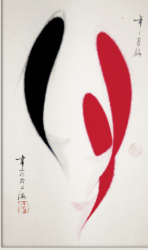- What is Traditional Chinese Medicine (TCM)?
- How can Chinese Medicine be used?
- What kinds of conditions has Shelley had special experience in treating?
- How many treatments will I need?
- How will I know if I need herbs or acupuncture?
- Who pays for the treatment?
- Is there anything I need to do before a consultation?
At the core of Traditional Chinese Medicine (TCM) is the belief that the human body possesses an innate harmony or internal balance. The task of the physician is to identify disharmony when it occurs and assist the body in regaining its natural state of well-being.
TCM aims to treat not only the presenting complaint, but also looks for the cause of a problem. Rather than concentrating on easing symptoms temporarily, the emphasis is on treatment of the whole person. This means taking into account the body mind responses: the physical symptoms and the person’s inner feelings. All areas of life can have an influence on the quality of the flow of energy through the body. For example, the symptoms of how you feel about becoming sick can be just as important as the illness itself.
By treating the body-mind as one integral whole, the physician selects from a number of treatment options to correct the free flow of qi (energy), blood and body fluids between the organs and meridian pathways. When the body exists in a state of harmony and balance you will feel good – experience a sense of well being.
The World Health Organisation has announced publicly that acupuncture is suitable for treating the following:
+ Ear, Nose and Throat Disorders. + Respiratory Disorders. + Gastrointestinal Disorders. + Eye Disorders. + Neurological and Muscular Disorders.
Chinese Medicine has managed to keep a quarter of the world’s population healthy for over 2000 years in China, treating a host of other problems, such as knee pain, sprains and strains and most gynaecological complaints.
It is also used in the West to manage stressful lifestyles, to treat bacterial and viral infections, regulate gastrointestinal function and to assist withdrawal programmes.
Treatments not only resolve illness, but are also used to restore and maintain health and well-being. Acupuncture and Chinese herbs are used commonly to prevent future illnesses from occurring.
Although Chinese medicine doesn’t treat “diseases”, it treats the whole person’s underlying ability to deal with illness. Westerners tend to arrive with problems that are Biomedically defined – Shelley has treated people who have arrived with the following disease names:
Acute ear infections in children, angina, asthma, Bells Palsy, colds, emotional distress, diabetes, endometriosis, fertility& gestational problems, flu gastric disturbances hay fever insomnia Menieres Syndrome menopausal complaints migraine menstrual irregularities musculoskeletal complaints neuromuscular complaints, painful periods, post stroke recovery, prostate difficulty, PMS, RSI, sciatica, sleep disturbances, trigeminal neuralgia.
If you have a condition not listed here; it does not mean Chinese Medicine cannot help you. This list is a guide only. Any condition diagnosable according to Chinese Medicine is treatable according to Chinese Medicine. (CM does not treat cancer, but it can support you through chemotherapy or radiotherapy to reduce side effects or help improve cancer drugs intended effects).
If you’ve had a problem a long time, then it will take time to change that. If a problem is new, it will respond straight away. If you are using Chinese Medicine for on-going well-being, then you may like to use it as a regular feature of your routine. Periods of extra stress benefit from treatments more often. Each case is unique.
It is a good idea to have three sessions then assess your progress. Gynaecological conditions are best assessed after 3 cycles of treatment. Pain syndromes are better treated twice weekly for 4 weeks to sustain change. Choose to make the time to come regularly for greater effect.
If you are needle phobic, or you don’t like the idea of taking something regularly, then you can decide for yourself which you prefer.
Most conditions can be treated with either system. Some conditions are known to be better treated by herbs, whereas others are better treated with acupuncture. Your practitioner can advise you. Generally, skin conditions and gynaecology are the specialty of herbalists, while musculoskeletal/neuromuscular conditions (backs, RSI , Bell’s palsy, hemiplegia after stroke and the like) are the forte of acupuncturists. This is not absolute. Gynaecolgy and ‘backs’ respond better if both herbs and acupuncture are combined. An acupuncturist can effectively treat your skin condition and periods, or a herbalist can help your back, regardless of the generalisation above. The range of conditions that TCM can treat is not limited to only these examples.
Most conditions respond more effectively to a combination of both herbs and acupuncture, with a greater net effect.
For the maximum benefit from your treatment:
Arrive with time to sit quietly. Racing in will change the pulse quality. The pulse is an important guide to diagnosis. Do not clean your tongue, or consume foods and drinks just before you come, e.g. 1 hour. The tongue is also an important guide. Avoid treatment when excessively fatigued, hungry, or shortly after consuming alcohol, coffee or a large meal.
